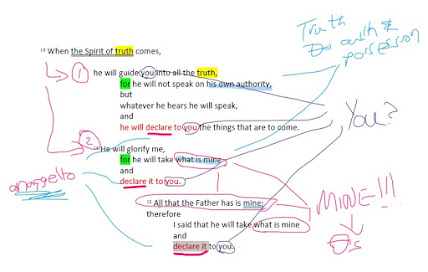Here is an example of an upcoming preaching text of mine.
The opening sentence to the passage gives us our theme: "When the Spirit of Truth comes". Well what can we expect? Well a simple analysis of the sentence structure and relationship of sentences shows us that we can expect 2 things:
1. He will guide you into all truth.
2. He will glorify me.
The little word "for" following those statements provide explanation to each point. In both cases it is the Spirit who "declares" to you. He declares what is "owned" by God and He declares it on the authority of God.
One of the only issues to complete the understanding is to determine who the "you" is. Of course the context will amply satisfy the answer as being The Eleven (the Apostles).
Now my point in showing this is for the reader to note that in expositional preaching even the outline and the subsequent points come FROM the text, not the preacher. Now there may be a slight variance between preachers, but in essence, to rightly expose this text, the differences should be minor, for we are all exposing the same text. I find it hard to believe that an expositional sermon on this passage would be much different from pulpit to pulpit. Are we not all called to simply plagiarize the Bible?
“They read from the book, from the Law of God, clearly, and they gave the sense, so that the people understood the reading.” (Nehemiah 8:8, ESV)

